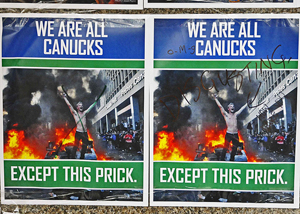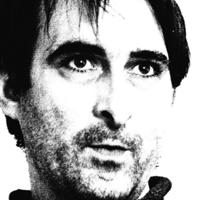
Last week, a small group of people profoundly embarrassed some of us here in Vancouver. They behaved unthinkingly, in a sort of mob mentality, with their small-town ways and their hysteria fanned by the local media. They cheered on violence and gurned for the cameras. And before that, there was a riot.
Let us be clear: the riot was a pretty pointless affray, a needless and eminently avoidable commotion that deserves no celebration.
The riot was not started by anarchists -- though it's impressive that anarchism is still, apparently, in the 21st century the political scapegoat of choice, and that this should be the first stereotype to which the city mayor turned.
It was not political, except in the most indirect of ways. As my colleague Gastón Gordillo puts it, "the nihilism that fueled the riots is that of a popular culture that places victory in sports above anything else, in an expensive and corporatized city that does not offer its youth other sources of collective passions and identifications." Larry Gambone argues that the riot was the expression of anomie on the part of the disaffected young people who "have no future and somehow know that. Future means working in Walmart. Future means never being able to afford a dwelling in the Vancouver area even if they scored a halfway decent job." But this seems to be contradicted by the news that (for instance) one of the most high profile pictures, of a young kid trying to set light to a police car's gas tank, is in fact of a star athlete, son of a surgeon, headed to university on a scholarship.
No, the rioters were simply Vancouverites. As far as I could see, they were a fairly representative cross-section of people, men and women, of all races, all social classes, and a range of ages. They were psyched up by the occasion, much hyped by the media, and some of them had been drinking for hours.
Into the vacuum
Most importantly, at least by the time that the trouble spread to the Bay department store (focal point of the riot and now of the subsequent memorialization), the police had abandoned the streets and gone into full riot mode at blockades set up on the periphery. In the space carved out by this upping of the ante, things accelerated as people found that they could do what they wanted without any immediate repercussions. They were soon acting out fantasies engrained in popular culture and modeled by the millionaire sportsmen on the ice. For some, it must have felt like a carnivalesque moment in which anything was possible: an intoxicating notion, especially for the intoxicated.
The media, city council, and police had together constructed a temporary state of exception -- that, indeed, is what "reading the riot act" is all about -- in which the regular rules no longer held. Criminalized in advance, with the cops lobbing tear gas at them from some blocks away, plenty of young people (though still by far the minority of the crowd) took advantage of the situation to break windows, set fires, turn over a few cars, and loot a couple of downtown Vancouver's larger chain stores.
The main troublemakers -- or the people who most egregiously filled the vacuum left by the forces of law and order -- will no doubt be charged and prosecuted, and rightly so. I have no interest in defending the rioters. But it's worth looking at what they did, before all traces of the violence are swiftly swept away.
It's significant that almost all the crime was against property, rather than against people (apparently the majority of the personal injuries were caused by the police tear gas and pepper spray). Also that the damage was remarkably localized and selective: the Bay was a magnet for looting probably not only because it is an establishment icon (the former Hudson's Bay Company once had quasi-state powers under the British Empire, much as the East India Company did in the Orient), but also more banally because its ground floor show-rooms have easily-portable items of high value: perfumes, bags.
This wasn't a riot in which people were carting off consumer electronics or food. It wasn't a riot of professionals or of the poor. Again: it was an opportunistic riot of ordinary Vancouverites.
But almost all the immediate post-riot response aimed at denying this perhaps unsettling fact. And so the embarrassment begins.
Self-righteous lynch mob
The dominant post-riot response in the media and on the Internet has been that of a self-righteous lynch mob. And they have the cheek to call themselves the "real" Vancouver.
This "real" Vancouver cheers on violence. There have been those who have used the event as an excuse to call for state repression: "How about a total media blackout and we let the police REALLY do what should be done?" I have heard many arguing that the riot shows that Canadian society has become too liberal, too tolerant. This is no doubt music to Conservative Prime Minister Stephen Harper's ears. The headline on the front page of the Vancouver Province was "Let's Make Them Pay," encouraging the online vigilantes who have set up Facebook groups and and websites to post images of alleged rioters in a sort of dystopian social media society of surveillance. Big Brother meets the Wild West meets Mark Zuckerberg. Nobody talks of civil liberties or little principles such as the presumption of innocence. And this is from people who claim to uphold the rule of law. Their unthinking hypocrisy is breathtaking.
For hypocrisy is the order of the day among the upstanding citizens who are so keen to express their dismay, moral outrage, and embarrassment at the so-called thugs, idiots, morons, hooligans (choose your own pejorative) who supposedly conjured up the violence out of their back-pockets with a couple of cigarette lighters and a brick or two.
This "real" Vancouver carves the city up into an "us" versus a "them." The double standards are everywhere evident on the boarded-up windows of the Bay that have become an impromptu shrine to civic pride and social scapegoating. The same photos that circulate online are plastered up with the slogans "We Are All Canucks... Except this Prick." Or "We Are All Canucks... Except this Jerk." Graffiti claiming "We Love Vancouver" and "We are One Family" is unironically scrawled next to declarations that the rioters should "Get Out of Town and Stay There." The city is to be made whole again by banishing its undesirables and denying that they ever had anything to do with an "us" that is pure and virtuous thanks only to this knee-jerk demonization.
This "real" Vancouver pits downtown against the suburbs, "real" fans against supposed anarchists, heroes against hooligans, and actively undoes the social solidarity previously promoted through the ubiquitous propaganda that "We Are All Canucks." Frankly, though I've been following the team, I've never felt much like a Canuck; I'm not paid anything like their stratospheric salaries, for a start. The slogan was always an artificial imposition (already, Graham Lyons persuasively argues, a "mob mentality") that tried to deny any social differences, all the better to sell us a uniform of over-priced jerseys.
But those differences have been re-asserted, quite literally with a vengeance.
We now have Canucks and anti-Canucks, Vancouverites and anti-Vancouverites, angels and devils in a devastatingly simplistic (and violent) division between good and bad. And the "good," the "real" Vancouverites who set to work to clean up the post-riot debris pose for the cameras in a mirror image of those gurning in front of burning cars they so quickly replaced.
Let's get real about real
There's nothing particularly wrong with civic volunteerism, of course. Let's just hope that this is not simply a spectacular frenzy that is repeated only every 17 years. Let's just hope that these same people move on to volunteer in the Downtown Eastside, the neighbourhood that is Canada's poorest postcode, located just a few blocks from the site of this week's disturbances. Sadly, I doubt it.
Street-cleaning, moreover, is normally the preserve of municipal crews -- who were indeed already on the streets and in action while the violence was still going on, and long before any of the much-ballyhooed good citizens showed up. Those people deserve our gratitude, too, as much if not more than these once-a-decade volunteers; more so if anything, as they have to clear the debris after every drunken Saturday night in the Granville Entertainment district. But nobody seems to mention them. Again, it is no doubt music to Harper's ears, as he strips our public services, to hear the fantasy that trumpets volunteerism instead of properly-funded social programs as the cure to civic ills.
This "real" Vancouver depends upon fantasy: the fantasy that cheering for a professional sports team is some kind of noble cause rather than, as my colleague Alec Dawson sadly notes, complicity in "an endeavor devoted to turning public goods into private wealth." But above all the notion of a "real" Vancouver builds on the fantasy that violent exclusion will somehow make this a "world-class" city.
"World-class" cities prove their status mostly by not worrying about whether or not they are perceived to be world class. And for good or ill, it would be hard to name a major world city (Paris, London, Buenos Aires, Mexico City) that does not have its history of riots and social disturbances. Real cities, unlike this fantasy of a "real" Vancouver, have social tensions, divisions, disagreements, off-days and on-days, that sometimes erupt in violence, sometimes not. It's the dream of purity, of niceness untroubled by difficulty and difference, that reveals continued provincialism. We saw this already with the Olympics, and the effort to present an image of the city that erased its homelessness and drug problems in favor of the literally incredible myth of "Super Natural British Columbia."
All this should be obvious enough. A moment's reflection would reveal that the riots tell us something about the city, a city that is rather more real than the so-called "real" Vancouver. Fortunately, soberer voices are now emerging: some thoughtful and reflective blogposts and newspaper articles that are starting to question the myths that emerged in the first few days. And the mayor and the chief of police are having to backtrack from their initial claims that the violence was the work of an organized few. They admit that "most of the people that joined in the riot and that have now been charged represent a wider spectrum of young people, many of whom do not have criminal records."
The violence itself was not particularly novel, neither for this city (how many times had we been reminded about the riot of 1994?) nor for others like it. What is perhaps new, noteworthy, and ultimately most disturbing has been the virulence of the post-riot reaction, its hysterical attempt to protect Vancouver's fantasy image as the "best place on earth" by excluding undesirables, as well as its unholy alliance with social media. But for all its slightly sinister surrealism, this clamorous post-riot discourse also tells us something real about ourselves and our city. As UBC student Miriam Sabzevari eloquently observes, it tells us that there is a significant minority who "have a need to feel morally superior to others -- and when an opportunity comes to bask in our superiority, we actually become quite relentless in it."
These are people who really should know better. They are the ones who embarrass me. ![]()















Tyee Commenting Guidelines
Comments that violate guidelines risk being deleted, and violations may result in a temporary or permanent user ban. Maintain the spirit of good conversation to stay in the discussion.
*Please note The Tyee is not a forum for spreading misinformation about COVID-19, denying its existence or minimizing its risk to public health.
Do:
Do not: